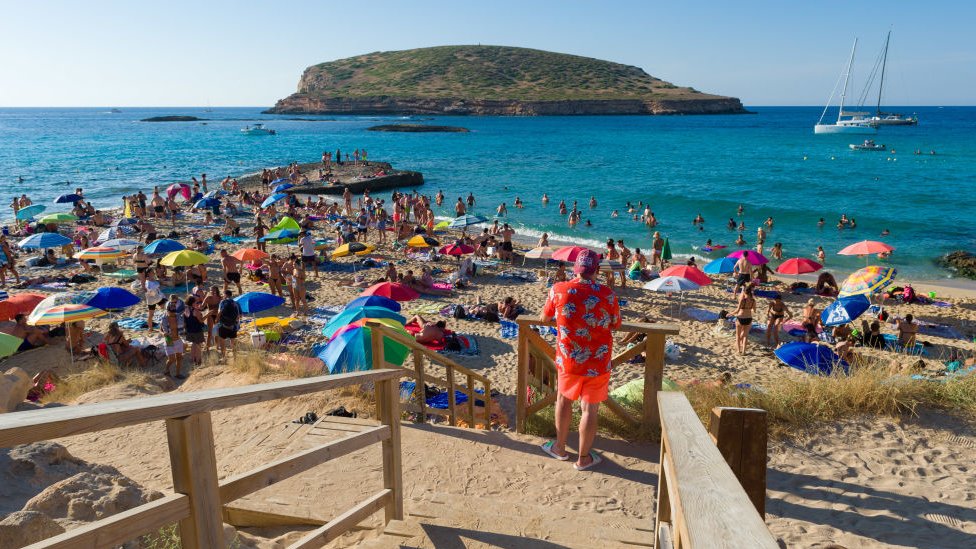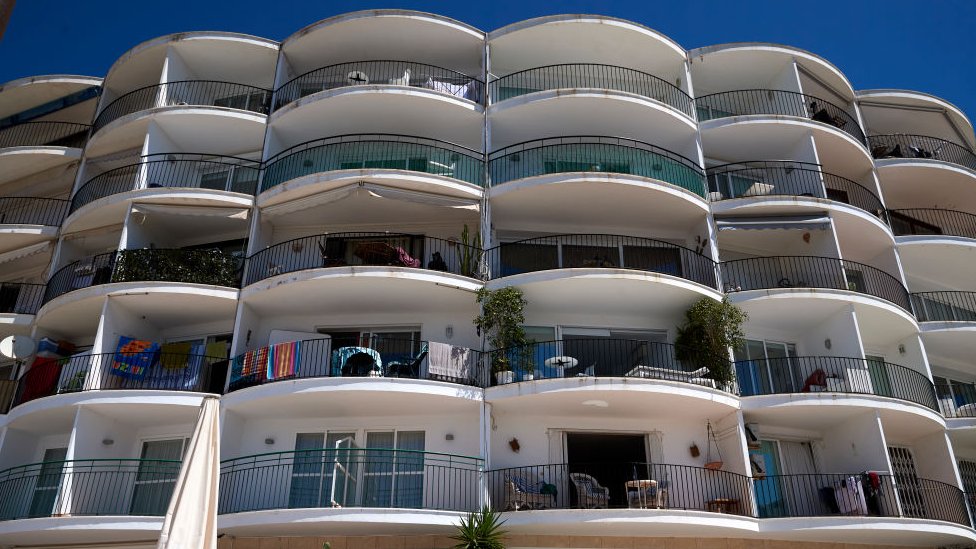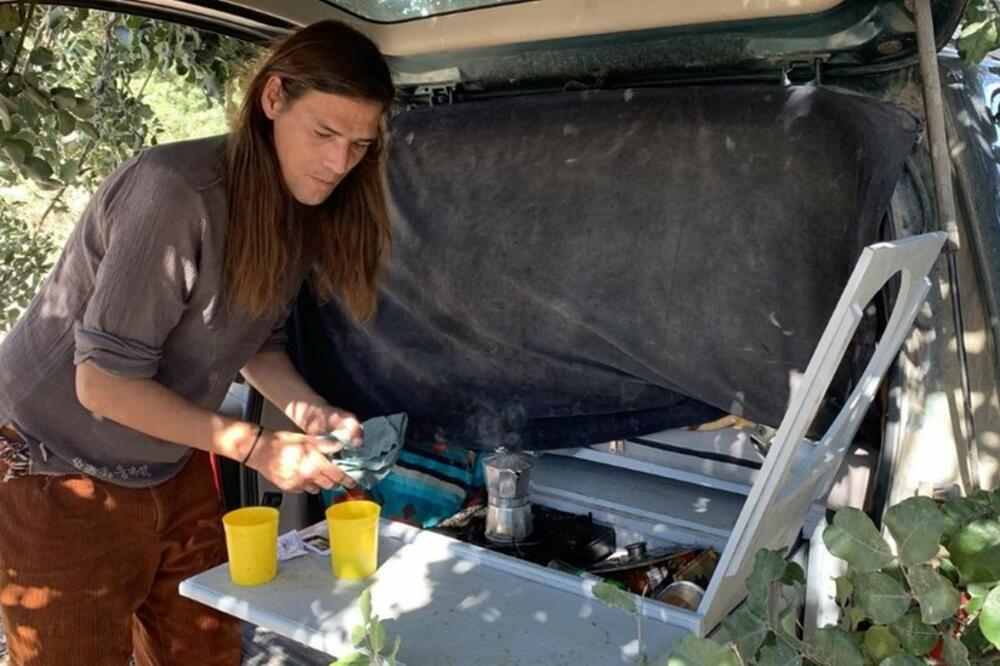Sesar Nebrera pours a cup of coffee that he made on the stove in the trunk of his car.
An old green Kia sedan is parked in the shade of a carob tree just off the main road near Ibiza town.
"I miss the basic things that make life comfortable, like being able to stand up straight in your home, cook normally, or open a drawer and take socks out," he says.
"That's what's missing when you live in a car."
Kia has been Sesar's home for the past three years.
He works as a chef, but since the prices of accommodation on the Spanish island of Ibiza are constantly rising, he cannot afford to live in an apartment.
"Accommodation in Ibiza is very expensive and getting more expensive," he says.
"And rent prices are completely out of sync with earnings.
"So this kind of life is an alternative. It's less comfortable, but it allows me to continue living on the island."
- Social housing in Serbia, a solution that creates new problems
- How to get to a house in the countryside in Serbia
- Measure three times, cut once - how to choose a quality apartment in Serbia
Ibiza is one of the four main Mediterranean islands of the Spanish Balearic Islands, along with Majorca, Menorca and Formentera.
Due to high rents, many who work in Ibiza live in similar conditions.
The Ibiza police announced last year that "three or four" of its officers live in vehicles.
Some locals have started living in tents or extremely poor shared accommodation.

Danijel Granda, a spokesman for the organization that represents local apartment tenants, says that this is common.
"A lot of people are forced to live in pretty miserable conditions, and slums are starting to pop up all over the island," he says.
"Since we don't have the possibility to find accommodation that would allow us to live a normal life, we who live on the island feel that we have been expelled from it".
Due to high interest rates and the recent increase in the cost of living, many Spaniards have given up on buying real estate, which has led to an increased demand for rental accommodation and consequently rising rents.
Only during 2023, rental prices in the Balearic Islands they grew by an average of 18 percent, while the average growth in the country is 12 percent.
However, Ibiza's status as a tourist center that covers a relatively small area has additionally contributed to this trend, so in some cases rent prices have increased by up to 40 or 50 percent in the last year alone.
Isabel Maria Peres, who is looking for affordable accommodation on the island, says that the monthly rent of a room costs between 700 and 1.000 euros, and that the price of a modest apartment is around 1.500 euros.
Isabel, who is a cashier at a supermarket, and her partner, who works at a five-star hotel, had to move out of their rented flat when it was sold.
Since then, they have been living with Izabela's mother-in-law.
Isabel, who is originally from the central Spanish region of Castile-La Mancha, says that due to housing problems, she and her family are now considering leaving the island.
"In other parts of Spain, the problem is that there is not much to do," she says.
"Here you can find all the jobs you can imagine, but you have nowhere to live."
- Why do people in Serbia move from the city to the countryside and what do they do in Vrmdža
- Digital nomads in Serbia only passing through
- When the whole world is your office: "I worked from home in 78 countries"
- Malta - an island where digital nomads are welcome
Unemployment in the city of Ibiza, the capital of the island, is below five percent, in Madrid it is eight percent, while it is 8 percent in Seville, the capital of Andalusia.
Ibiza, which has only 160.000 inhabitants, set a new record for the number of tourists last year, which reached almost four million, and 84 percent of economic activity on the island is related to tourism, according to local authorities.
Although the hotels, restaurants and clubs on Ibiza offer many opportunities for work, much of the accommodation on the island is only available at tourist prices, so local workers cannot afford it.

The Balearic Islands' conservative government, which came to power last year, has decided not to implement a housing law approved by the state government in Madrid that would cap rents in parts of the country where rents have risen sharply.
Instead, the local authorities mostly shift the blame to Ibiza property owners who rent out accommodation for short periods, despite local laws requiring a minimum six-month lease.
The local government says that since 2019, it has issued fines for illegal activities in the field of tourism in the amount of around four million euros.
"The problem is that the earnings from renting for a day or a week are much higher than what is legal," says Juan Miguel Costa, director of the Ibiza Tourism Council.
He says that regional and municipal authorities must fight together against "the practice of impunity on the island, because it is very easy to illegally offer an apartment [to tourists] in a residential building or a property, such as a house or a holiday villa without having a license to provide accommodation services".
Kosta adds that the fact that many apartments are empty throughout the year also contributes to the high rent prices, because the owners are afraid of possible illegal occupation of their properties, which is why the offer of housing for local workers is further reduced.
The irony of Ibiza's housing crisis is that it now threatens to threaten the tourism industry which is widely seen as the main culprit behind rising rents.
"Everybody who lives here is saying the same thing: somebody has to give in, because the prices keep going up," says George McBlain, one of the directors of the disco and restaurant. Or Beach, which employs people from the islands, mainland Spain and abroad.
"It is obvious that wages are increasing, but not enough," he adds.
Watch the video: Buying an apartment - what you should pay attention to
Follow us on Facebook, Twitter, Instagram, YouTube i Viber. If you have a topic proposal for us, contact us at bbcnasrpskom@bbc.co.uk
Bonus video:




